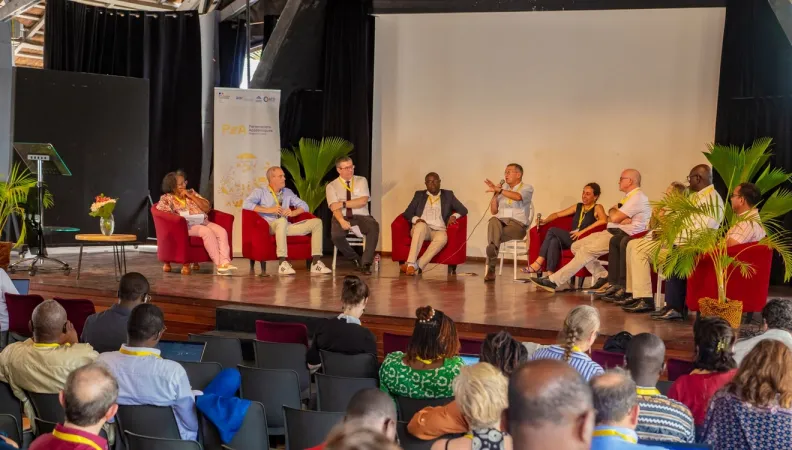Share the page
The first seminar of the Academia Partnerships Africa-France (PeA) program: a unique collaboration
Published on

From December 10-12, 2024, the Institut Français in Cotonou hosted the first seminar of the Academia Partnerships Africa-France (PeA) program. Organized by Agence Française de Développement (AFD), Campus France, the Agence Nationale de la Recherche (ANR) and the French Embassy in Benin, the event brought together nearly 180 attendees, including the leaders of PeA-supported projects, as well as key players from the academic and research ecosystems in Africa and Europe.
PeA program 1st seminar
Launched in 2020, the PeA program aims to bolster higher education and research in Africa by financing Franco-African academic partnerships. The goal of these collaborations is to develop job-oriented training programs (bachelor’s, master’s, and doctoral) in the economic sectors that are priorities for partner African countries. To date, the first two editions of the program have enabled funding for 13 projects.
The seminar gathered all PeA stakeholders for the first time, providing a singular platform to conduct an initial results assessment and collectively consider future prospects. Over three days, the collaborative dimension of PeA was highlighted. As Claire Giry, ANR President and CEO, noted, “PeA is a unifying program […] which now involves close to fifty higher education and research institutions across eight different countries.”
The event opened with talks underlining PeA's ambitions and encouraging initial results. Nadège Chouat, France's Ambassador to Benin, reaffirmed France's commitment to this strategic partnership. She emphasized the seminar's significance: “This is an excellent opportunity for dialogue and reflection on current and future partnerships, crucial to sharing our best practices and consolidating and renewing our collaborations in the spirit of reciprocity.”
Eléonore Yayi Ladekan, Benin's Minister of Higher Education and Scientific Research, welcomed the opportunity that PeA represents for higher education development in Africa. She drew special attention to the potential opportunities: “We are hoping that the PeAs will enable us to address the new challenges facing African education, notably professionalizing training, developing high-level research, and improving the employability of young people contributing to a priority economic sector.”
The seminar offered a rich agenda of roundtables, conferences, and 25 workshops. Attendees addressed key themes for project deployment, such as training professionalization, educational innovation, partnership sustainability, business involvement, and promoting gender equality in training program access and success. Many guests, such as Christian Estrade from the French Ministry of Europe and Foreign Affairs, Moussa Diaby, Director General of the INP-HB institute, Francine Aissi from the National Employers' Council in Benin, and Nathalie Nilsson-Thiello from the French Ministry of Higher Education and Research, spoke on these various topics.
Read also: Africa-France academic partnerships focus on gender equality and employability
Experience sharing helped identify common solutions and highlight several concrete achievements: launching new programs, overhauling syllabi, training teacher-researchers, funding doctoral students, supporting international mobility, and creating an entrepreneurial village. It was noted that, to date, 28 bachelor's, 29 master's, and 11 doctoral schools or training programs have been established or are currently being set up by the 13 projects.
By forging closer ties among project leaders, this first seminar marked a significant step in strengthening partnerships and laid solid foundations for future project completion. As Virginie Delisée-Pizzo, Head of AFD’s Education and Training Division, commented in her closing address: “During these three days of reflection, exchange, and experience sharing, we have demonstrated that collective commitment and cooperation between France and African countries can produce ambitious and inspiring results. […] We have successfully identified three key avenues for the future: educational and technological innovation, equality and inclusion, and the academic and financial sustainability of projects.” She concluded by announcing that a second PeA seminar will be held in 2026 to continue this collective momentum.
